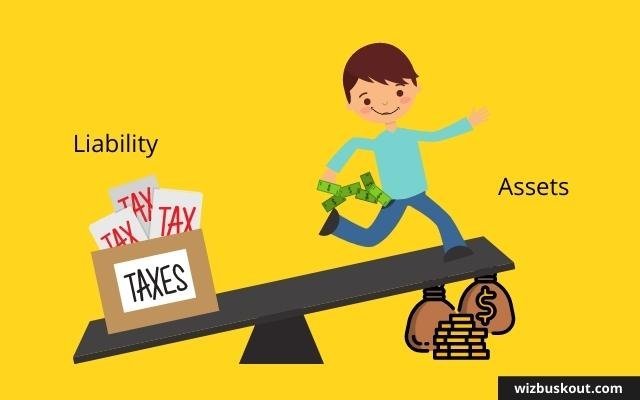What’s in it? Quick Summary
Rich Dad Poor Dad Summary by Robert Kiyosaki teaches you why it is crucial to get financial education and how you can become wealthy by building high-quality assets that would make money work for you.
Who should read the Rich Dad Poor Dad summary?
- Anyone lacking financial literacy.
- Anyone curious about what differentiates rich dad from poor dad.
- Anyone who wants to become crazy rich.
- Someone who needs to build the right mindset when it comes to money.
Rich Dad Poor Dad Summary (PDF)
Are you struggling to pay your bills?
Probably, you are reclining on your sofa and wondering if you should cancel next month’s Netflix subscription as it is getting difficult for you to meet standard requirements.
Maybe the stock market is down, and that is affecting your lifestyle.
You want to invest in the share market but fear that you’ll lose all of your hard-earned money.
Perhaps, you are tired of your corporate job and thinking about how rich people make so much money while you’re struggling to buy even a Choco Lava cake you desire so badly.
If you’re experiencing any of the above, you aren’t alone.
Most of the people in this world are going through the same dilemma.
Kiyosaki explains in this book what makes a rich dad rich and an educated dad poor.
And in this Rich Dad Poor Dad summary, I’ll share insights or the nine lessons I learned from this book.
Let’s get started!
1. Work on your assets, and destroy your liabilities.

First, let’s understand what we mean by assets and liabilities.
An Asset is something that makes your pocket heavier. By “heavier,” I mean — rich with money or something of value.
Common assets may include a product you purchased, a business you own, or any passive income source that puts money in your wallet.
Anything that gives you returns after you own it is an asset.
Liability is something that makes your pocket lighter. It reduces your bank balance and hardly gives you any return.
Primary liabilities may include your house tax, electricity bill, food bill, water bill, a subscription you purchased, a debt you’ve to pay, and many more.
Your focus should be on buying or owning assets and reducing liabilities as much as possible.
But the truth is, it’s challenging to live with zero liabilities. You need to pay bills, right?
And that’s why you need to understand cash flow.
Recommended summary: Millionaire teacher
2. Become curious about how money works.

I thought only adults could deal with money back when I was a kid, so I never bothered to learn about it.
I don’t want anybody else to make the same mistake I did.
Learn as much as you can about the money.
But the thing is, it isn’t something you can learn overnight. It’s a lifetime process.
Read blogs and listen to the podcasts discussing mutual funds, the stock market, investing, budgeting, income statements, cash flow, taxes, and the list goes on…
Here are a few blogs that’ll help you enrich your knowledge of financing:
When you start learning about money, you develop the attitude rich people have and see various ways to build high-quality assets by leveraging your opportunities and resources.
Suggested summary: I will teach you to be rich by Ramit Sethi
3. Never let your fear guide your Finances.

Most people struggle with financing because they are too afraid to risk money.
Such people don’t invest money in building their assets to generate thousands of dollars.
Everybody knows that risk is a part of the money-making business, but many miss out on golden opportunities being wrapped up with fear.
Their fear guides them.
Such people compromise with low income and never dare to leap into the territory of the rich.
If you want to make your way up to the realm of royalty, you mustn’t let your emotions get the better of you.
Suggested summary: The behavioral investor
4. Break out of the infinite loop of misery.
If you ever observe an average person, you’ll see a loop.
He performs a loop of specific actions every day like waking up, going office, working hard till 5 pm, coming back home, eating, and then sleeping.
This is what I call an infinite loop of misery, also known as the rat race.
Most people are stuck in it. They have become so comfortable running in that race that they don’t even bother about it anymore.
You might be thinking, what’s wrong with that?
When you are running a rat race, it’s probably because you don’t know how to think and have no idea about what is good for you.
A lot of people choose a job that is not right for them.
But they decide to do it because it looks safe.
Now, don’t get me wrong, I’m not against the job.
The problem is with not choosing the right thing to do.
When you choose the wrong job, you trade your time for money and do someone else’s work that hardly means anything to you.
So stop running the rat race. Stop following your friends.
Look at the options and figure out what is right for you.
This brings us to the next lesson.
5. Strive to learn, not to work.

What do you think prevents an average middle-class person from getting rich?
It’s the reluctance to learn and invest in skills they can capitalize on.
When you work just to earn money, you don’t strive to learn.
Such people don’t learn about building assets.
All they believe is in the notion of working and getting paid for it.
When you do this, your assets are soon outclassed by your liabilities.
And by not having proper knowledge about assets and liabilities, they unintentionally grow their liabilities.
The result? They spend their life paying debts.
It is way easier to build liabilities than it’s to make assets.
Unless you have valuable assets and the knowledge to build money from them, joining the class of riches is out of the question.
Check out: Best finance books of all time
6. Don’t chase after a few bucks.
Who doesn’t love money?
After all, it buys you all the basic stuff like food, water, shelter, etc.
People get so obsessed with acquiring wealth that they participate in get-rich-quick schemes.
They do stuff that brings them a few bucks in the short term.
When you nurture the idea of accumulating wealth quickly using money-making hacks, you forget that the royal road to riches is long.
One needs patience, persistence, courage, and perseverance to walk this road.
There will be times when you’ll hit a wall. But he, who will persevere, will enjoy the fruits of victory.
Suggested summary: Die with zero
7. Job isn’t a long-term fix.

There is a myth among all the people that if you want to live a good life, then go to a decent college, get an excellent degree, find a job, and then get paid for it.
This is what an average person thinks, says Kiyosaki.
Job isn’t going to fix all your problems.
You only fool your mind into believing that you’re moving ahead in your life and building a bright future by doing a job.
You trade your life span for all the money you get paid; you invest your time building someone else’s asset.
Why don’t people put any effort into getting out of their job and build assets that bring them more wealth than they could ever make from a job?
This is because it’s hard to overcome obstacles that kick you in the face while you get out of the rut and escape the rat race.
Job has never been a long-term solution to the problems, and it never will be.
You could get fired or replaced anytime.
Things could worsen if you don’t have assets to back you up.
So start growing your assets even if you have a stable job.
8. A little greed beats laziness.
When it comes to laziness, you’re lazy if you are slouching all day and binge-watching Rick And Morty.
On the contrary, if you are busy working all day long, you are hard-working.
But laziness isn’t limited to just that.
Even if you’re a busy bee and avoid stuff you should be doing — you’re still lazy.
You’re lazy when you choose not to get out of the rut you’re stuck in.
Laziness can be a roadblock to producing large cash flow.
The question is: How do you overcome laziness?
It’s simple — by becoming greedy.
Poor people feel guilty when greedy and often try to suppress their desires.
They avoid stuff they’re supposed to do to become rich.
On the other hand, rich people embrace their desires or greed. In doing so, they look for possibilities and answers.
But there is a caveat: too much greed can harm you.
Therefore, by becoming a little greedy, you can beat laziness.
Also read: How successful people think?
9. Make the right money habits.

How much wealth you will acquire depends on your spending and saving habits.
Choose the right habits and money will come to you, choose the wrong habits and money will go away.
If you spend more than you earn, you’ll be on your way to poverty.
You should always save a few bucks and invest the rest in building assets.
When you do this every day, you accumulate more wealth and check your cash flow, which makes you money-aware.
Practicing the proper habits might make you wealthier over time.
After all, if you aren’t Richie Rich, you must make sure you adopt the right habits.
Rich Dad Poor Dad takeaways
Let’s wrap up the key lessons from this summary:
- Build more assets. Minimize your liabilities.
- Learn how the money game is played in the real world.
- Never let your fear guide you in your finance department.
- Get the hell out of that infinite loop of misery.
- The job alone isn’t a long-term fix.
- Build good money spending and saving habits.
Extra lessons you can learn on the Blinkist book summary app:
- How the fear of society’s disapproval prevents us from growing wealthy.
- How our emotions can guide us to make irrational decisions about money.
- How our education system has failed to train us about money management.
- How doing business can make you more wealthy when compared to your profession.
Blinkist is a non-fiction book summary app that provides summaries, audiobooks, podcasts, and more … from over 5000+ books.
I’ve been using this app straight for almost two years now.
And I highly recommend this app to busy people who love reading or listening to books.
👉Click here to Sign Up and Start Blinkist 7-days risk-free trial
Rich Dad Poor Dad Review
[amazon box=”1612680178″ template=”horizontal”]
Robert Kiyosaki gives an interesting angle to the concept of the rich vs. poor debate by introducing the story of a kid who had two fathers — a rich one and a poor one.
I liked the concept of building assets.
I had never thought that building an asset could put one on his way to becoming wealthy.
This book clarifies what you should focus on if you wish to get rich.
It categorizes a person as rich or poor based on his wealth.
But I think there is more to why a person gets rich or stays poor.
People Who Like This Book Also Like
[amazon box=”1722501235,0857197681,0984358102,1942121598,1533667926″ template=”table”]
FAQs about Rich Dad Poor Dad by Robert Kiyosaki
What is the summary of Rich Dad Poor Dad?
Rich Dad Poor Dad is the story of Kiyosaki who had two dads, one was rich, while the other was poor. In this book, Kiyosaki shares the lessons from his Rich Dad and decodes what makes rich people rich.
What are the main points of Rich Dad Poor Dad?
Build Assets, not Liabilities. Become more financially literate. Make your money work for yourself. Keep learning about money. Don’t celebrate mediocrity. Learn from rich people.
Is Rich Dad Poor Dad a true story?
It’s still a mystery if the Rich Dad actually existed or not. But it seems that Rich Dad was an imaginary character that Kiyosaki made to build a compelling narrative in the book and help the readers understand the concepts.
What separates rich from poor is their mindset, the ability to take risks, and the desire not to stay poor.
Why do people want to be rich?
People want to be rich because they believe that money can help them achieve freedom and happiness. But freedom and happiness aren’t attained just by becoming rich. There is more to it.
What are two most important things you learned in business from Robert Kiyosaki?
First, make as many assets as you can to stay sane. Second, keep learning from people who have the results you want.
Is Rich Dad Poor Dad good advice?
Yes, Rich Dad Poor Dad gives decent advice.
Where to get this book?
You can get this book on Amazon: Check the price here.
Liked Reading Rich Dad Poor Dad Summary?
If you enjoyed reading this summary, then please share this with the people who you think need to learn about finance and thus become financially educated.
Now you tell me!
What do you think about the rat race?
What is the biggest asset you have?
Do you believe that home is a liability?
Tell me in the comments.
Want to consume more insightful, power-packed content like this in the future?
Subscribe to the weekly email newsletter.
Subscribe to YouTube channel for animated video books.
Try Amazon’s Audible 30-days Free Trial and Get 2 Audiobooks for free.

